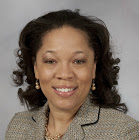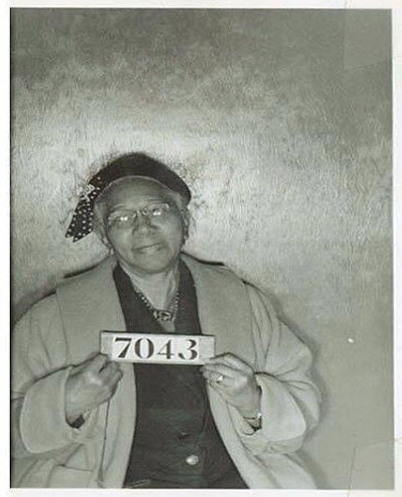NICHQ Employee Spotlight:Dana West

Full name and title: Dana West, Ph.D., Associate Project Director of Equity
Years with NICHQ: 7 months
How has your background led you to join a national children’s health organization?
“I grew up with uber-liberal parents and grandparents who were heavily involved in the Civil Rights Movement. In fact, Dr. Martin Luther King, Jr. touted my great grandmother, Mrs. Irene Augusta Moore West, the “real mother of the movement” in Montgomery, AL. A family background rooted and steeped in civil rights and social justice created an environment where I interacted with people from all walks of life early on and even today. No topics were ever off the table, which led me to be able to confront and discuss issues that folks, in general, may be uncomfortable tackling. I am most thankful for this upbringing because it allows me to empathize and examine additional considerations and to better understand ways to serve and create meaningful change within communities, especially those that I am familiar with and impassioned by.
My passion for service is also fueled by my long family history of education through historically Black colleges and

universities (HBCUs), specifically Fisk University, Meharry Medical College, Tuskegee University, and Tougaloo College. At these institutions, we received not only academic enrichment but also introduction and nurturing of our role in demanding civil rights and social justice and a lifelong commitment to servant leadership. This history led me to my role as executive director of the Tougaloo College George A. and Ruth B. Owens Health, Wellness, and Human Resources Center charged with securing local, foundation, and federal funding to support public health initiatives serving communities of color in Mississippi. A state that, historically, ranks nationally at or near the bottom on all maternal and child health indicators with the disproportionate share of adverse perinatal and infant outcomes among Black women of reproductive age. To combat the associated disparities and other issues unique to the Black communities within the state, I led our team to identify and apply for $11.54 million in funding and to secure $7.24 million in total grant awards. Tougaloo College has 152 years of civil rights and social justice history from its Amistad beginnings to its current work in eradicating modern-day slavery.
Prior to serving at Tougaloo College, I served as policy analyst with the MS Department of Human Services, Child Protection Services, community health director with the MS State Department of Health, and associate professor of health sciences and health care disparities council member at the University of Mississippi Medical Center. Serving in education, policy, social justice, and preventive health and wellness and research focused on sexual and gender minority health and equity have all led me to NICHQ. NICHQ’s own Dr. Stacy Scott, an expert in Black grief, combating infant mortality, and birth equity of BIPOC birthing people, is an outstanding spokesperson for the incredible equity work within NICHQ and the communities it serves. Scott encouraged me to expand my reach to a national level and I began my journey with NICHQ on the National Action Partnership to Promote Safe Sleep Improvement and Innovation Network (NAPPSS-IIN). This has allowed me to witness firsthand NICHQ’s commitment to equity. I am especially grateful to witness all the great minds working together and finding new ways to better engage with one another and communities.”
What does your role as Associate Project Director of Equity entail, and how do you bring your past experiences to your work now with NICHQ’s Equity Team?
“My role is to ensure that we are exploring perspectives to galvanize a collective toward meaningful anti-racist, equity work. Much of this work, begins internally. In serving on various projects, the National Action Partnership to Promote Safe Sleep Improvement and Innovation Network (NAPPSS-IIN), and Equity Systems Continuum, my goal is ensure that we are considering perspectives inclusive of those involved and impacted. Consideration is a primary concern. I am more of a strategist in that way. I want to ensure that we are considering these perspectives and engaging with individuals and groups that are not historically heard, supported, and valued equitably. This translates to teamwork as well — making sure that your colleagues feel heard and acknowledged. What is important is that we acknowledge, support, and celebrate one another and our differences, which impacts the work that we do with the populations that we serve.
For example, when I joined the Equity Systems Continuum project, the iteration of the ESAT included three systems to describe where along the continuum an organization, health system is in its equity work — savior-designed, ally-designed, and equity-empowered. An early consideration was whether the team examined scenarios where an organization, system would land elsewhere on the continuum, closest to the least equity work or that had not begun the work. Here, I offered that we consider this possibility and more likely probability. The team in earlier iterations of the ESAT had considered this and through our intense collaboration and discussion the NICHQ Equity Team and external expert faculty found that a fourth system – supremist-designed – is necessary to capture this stage along the continuum. By including this fourth system, we ensure the breadth of systems is identified from those still rooted in and bolstered by white supremacy to those effecting intentional, impactful anti-racist change.”
What have been some of the most rewarding aspects of your role as Associate Project Director of Equity?
“Ironically, what has been most rewarding is finding that NICHQ is performing quite well in the interest of equity and that I am challenged with finding more innovative ways to move the needle. I have described NICHQ to so many as a unicorn – a place only imagined in presentations and seminars where equity is the foundation of its internal and external work, folks work in mutual respect of one another; employees are engaged; leadership is visible, approachable, and shares power at the ready; and endless professional growth opportunities abound. What can be more rewarding than finding a unicorn? Sharing the unicorn with others. To this end, I am eager to collaborate with the NICHQ Equity Team and staff as we continue to progress toward becoming an equity-empowered organization, together, and sharing this work with other organizations to aid in their efforts to achieve the same. NICHQ continues to demonstrate its commitment to and impact on children’s health. What is remarkable and central to its ability to accomplish this in a meaningful way is its internal equity work.”
What are some goals that NICHQ’s Equity Team hopes to accomplish in 2022?
“One of our primary goals is to finalize the Equity Systems Continuum framework and ESAT, administer the tool to MCH organizations and health systems, and provide tailored recommendations to creating, sustaining a social justice and anti-racist system of care. We are also furthering our efforts to establish NICHQ as a leader in equity through capacity and infrastructure building. This is seen in positioning equity as the foundation of our strategic plan pillars – Program Quality Transformation, Revenue Stability and Growth, Visibility and Engagement, Organizational Effectiveness – seeking and securing equity-focused projects, finding ways to infuse equity into existing projects, establishing and maintaining partnerships with other equity-focused organizations, and engaging with and sharing in the development of equity programming. In short, we are intentional in our efforts to achieve and maintain equity, exemplified in our internal work but also in our external work with communities, collaborators, partners, and others.”
